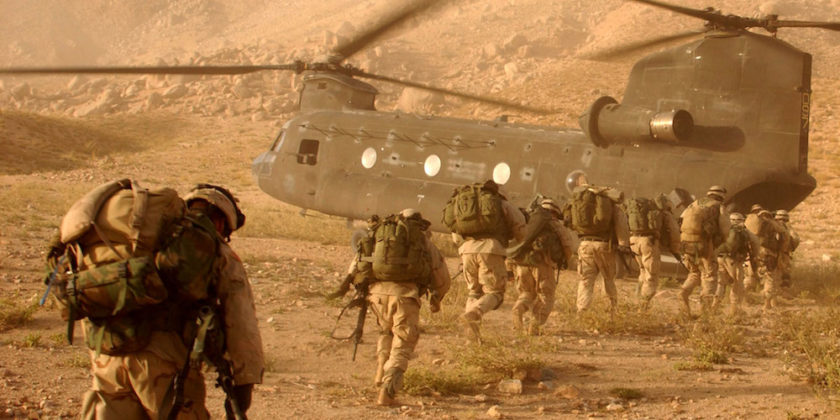Despite Sending More Troops, Trump Administration Fails To Put Forth A Strategy For Afghanistan
THE CITIZEN BUREAU

NEW DELHI: Senator John McCain had harsh words for United States President Donald Trump, slamming the administration for failing to "develop a strategy for success" in Afghanistan. "After nearly 16 years of war, we are at a stalemate in Afghanistan," McCain said. "Worse, we have no strategy to end that stalemate and achieve victory."
McCain’s strong words come as the US prepares to send more troops to Afghanistan -- a move that followed Trump’s decision to hand over authority to send additional troops to the war torn country to defence secretary Jim Mattis.
Interestingly, the announcement that the US was preparing to send more troops to Afghanistan didn’t come from Trump himself. The real estate mogul turned businessman -- who is usually very vocal on Twitter as well as in public speeches -- remained mum on the issue. In fact, Trump has said very little on Afghanistan, and the little he has said has been largely contradictory.
The news that Mattis will be deciding the issue of troop enhancement came as the Pentagon issued a news release outlining the decision. Trump, it seemed, had passed on the buck to Mattis, with the White House in fact downplaying the Pentagon’s vaguely worded statement which referred only to setting “troop levels” as a stopgap measure.
The decision to send more troops has met with considerable criticism, with many alleging that sending additional men before formulating a proper strategy was premature. McCain’s criticism on Monday is in line with this trend of growing frustration. "After nearly 16 years of war, we are at a stalemate in Afghanistan. Worse, we have no strategy to end that stalemate and achieve victory. The recent deaths of three brave American soldiers underscore the urgency for a new strategy to turn the situation around in Afghanistan," McCain said, referring to three U.S. soldiers who were killed by an Afghan soldier last week in eastern Nangarhar province.
The main point of concern is that even as America readies to send more troops, President Trump’s views on the war in Afghanistan -- now in its 16th year -- remain a complete mystery. It is unknown what the President thinks US strategy in Afghanistan should be, or whether he is even involved in the debate.
The President has said virtually nothing on Afghanistan since entering the White House or even in the Presidential race, and the views he expressed on Afghanistan whilst a private citizen were largely opposed to America’s involvement in the war torn country.
In the past, Trump has described the US’ involvement in Afghanistan as a “disaster” -- indicating that US troops should be brought home. However, when he spoke to Afghan President Ashraf Ghani in December last year, he assured the American-supported Afghan President of Washington’s continuing cooperation. Following the assurance, Trump failed to invite Afghanistan to his inauguration -- sending circles buzzing about the Trump administration’s potentially changing stance on Afghanistan.
When the commander of US forces in Afghanistan asked for several thousand new troops to break the stalemate that has developed in the conflict-torn country a few months ago, many wondered how Trump would respond. They are left wondering as the President refused to respond.
Meanwhile, the Taliban continues to push ahead. A report by the Special Inspector General for Afghan Reconstruction (SIGAR) office submitted earlier in the year notes a huge decline in the territory controlled by the American-supported Afghan government with corresponding increase in influence of the Taliban and other militant groups, including the Islamic State. In a worrying assessment, the report notes that the Afghan government had 57.2 percent of the country under its control by the end of 2016 — a 6.3 percent decrease from 2015. Reports from the ground paint an even more worrying picture, with the Taliban effectively in control of several Afghan districts, most notably Kunduz and Helmand.
As the US mulls its course of action, Russia and other regional powers seem to be making the most of the opportunity. Russia recently held a six nation conference on conflict-torn Afghanistan’s future in Moscow, inviting India, Iran, Pakistan, China, and Afghanistan. The conference was Russia’s second major intervention on Afghanistan, after it had hosted a tripartite meet last year that involved only itself, China and Pakistan.
It is worth reiterating that Trump’s inaction is only part of the problem when it comes to US policy in Afghanistan, which faced challenges even under President Obama as plans to rollback American troops were repeatedly extended and modified. Even today, more than 13,000 Nato military personnel remain in Afghanistan, most of whom are American. The original plan was to withdraw all troops by Afghanistan by 2014.
Related to the security situation in Afghanistan is the growing presence of the Islamic State in the country, with a series of recent attacks being claimed by the militant group. Although Trump has put forth a policy of wiping out the Islamic State, there is absolutely no clarity regarding how he intends to do so, and whether the group’s arms and affiliates outside of Syria and Iraq -- in Afghanistan, Pakistan, Yemen, Libya, Egypt, Tunisia (to name a few) -- figure in the larger plan.
The fact that’s quickly emerging is that no matter which way Trump finally decides to go, the disasters of the war in Afghanistan are becoming increasingly apparent. Despite a 16 year engagement and billions of dollars pumped in, not to mention lives lost, the Afghan government today controls less territory than it did at any point since the invasion in 2001. The Taliban is growing stronger, with civilian casualties rising year after year to record levels. At the moment, the silence is only adding to the uncertainty.



